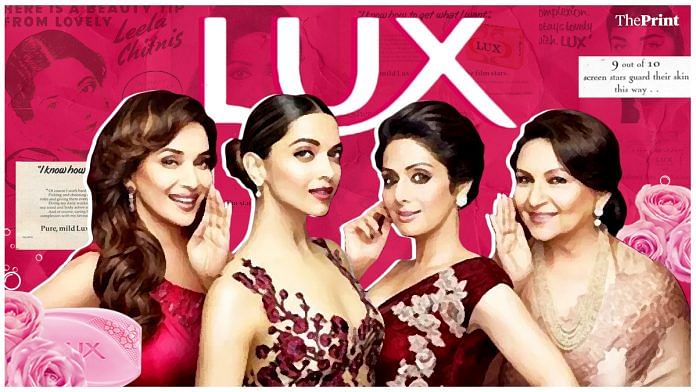New Delhi: “Filmi sitaaro ka manpasand saabun” (favourite soap of movie stars) — this was how Hindustan Unilever’s ‘Lux’ was first launched in India in 1941, with renowned Bollywood actress Leela Chitnis as its brand ambassador. A line in the soap’s first advertisement featuring Chitnis read: “9 out of 10 film stars use Lux toilet soap”.
Starring in successive hit movies such as Kangan (1939), Bandhan (1940), and Jhoola (1941), Chitnis was one of the most sought-after actors at the time and Lux was able to successfully position itself as the ‘beauty soap of the stars’.
It has since had some of the biggest names of Bollywood as its brand ambassadors. From Madhubala, Rekha, Meena Kumari, Zeenat Aman, Hema Malini, Madhuri Dixit, Sridevi, Aishwarya Rai, Juhi Chawla, Kareena Kapoor, Priyanka Chopra Jonas, Katrina Kaif, Anushka Sharma, Deepika Padukone to Alia Bhatt — the baton has been passed on from one generation to another.
“Lux is the quintessential ‘filmi sitaron ki soundarya saabun‘ that signifies a glamorous lifestyle. From the very beginning, there was a single-minded focus on building a brand of beauty soap with a strong association with movie stars,” Harish Bijoor, marketing consultant and the founder of consulting firm Brand Guru, told ThePrint.
Landing an endorsement deal with Lux came to be associated with the ‘arrival’ of a new movie star. “Being a Lux girl was recognition that the star had arrived. It was a kind of reverse endorsement by the brand for the chosen star. The relationship of star and brand Lux was symbiotic,” Bijoor added.
Also read: iPhone 1 — A ‘revolutionary’ smartphone that debuted at the 2007 Oscars
A luxury affordable to all
Targeting the upper and middle-class population, the British multinational company Hindustan Lever, now called Hindustan Unilever, promoted the Lux as a “luxury soap affordable for all”.
From “Hema Malini’s dream girl complexion” to “the light of Vidya Sinha’s smile”, the soap branded itself as the “secret behind beautiful faces” in the Hindi film industry.
When asked if it was an effective marketing strategy, Pradip Unni, a marketing and branding strategist based in Kerala, said, “The celebrity endorsement, or them calling Lux the secret behind Bollywood actors’ beauty, in the past as well as today, worked because it created memorability for the product, not just because a celebrity says so.”
In the 2000s, in a bid to further popularise their “mujhme star jagaaye” theme, the company launched its first promotional contest called “Lux star bano, Aish karo” featuring Aishwarya Rai.
The commercial sought consumers to buy the special promotional pack of Lux soap that came with a special scratch card. There were various rewards for the winners, including coming to Mumbai and living a day like Rai would.
Later, the company also made commercials with real-life Bollywood couples, with one featuring Aishwarya Rai and Abhishek Bachchan, and another with Virat Kohli and Anushka Sharma. Another major event was when Lux roped in its first male ambassador, Shah Rukh Khan, that flipped the game of advertising women’s beauty products by focusing gaze on a man instead of sexualising women.
‘Lux girl’ — a benchmark for Bollywood heroines
Unlike other soap brands, a deal with Lux also promised “reverse endorsement” for film stars.
For any new entrant, to appear in a Lux ad was to mark her or his arrival in the Hindi film industry. Even today, an endorsement deal with the soap brand is a benchmark of success for movie actresses.
Arguing how the wider reach and distribution of Lux advertisements during the 1950s provided an autonomous space for showcasing glamour in Indian cinema and helped actors gain publicity outside of big urban cities and towns, professor and author Sabeena Gadihoke, in an article titled ‘Selling Soap and Stardom: The Story of Lux’, wrote: “Many cineastes in India who recall the early Lux adverts would track them as a form of star iconography similar to checking out covers of popular film magazines like Filmfare. This might help explain the repetitive nature of this advert which was not so much about ‘selling’ soap as it was about ‘selling’ stardom.”
The Lux campaign, in photographer Gautam Rajyadhaksha’s words, was, “the company acknowledging that you had become a star and the star saying thank you.”
Also read: Marbels – fruity candies everyone loved in the early 2000s which mysteriously disappeared



